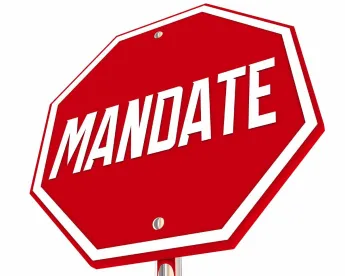Today the Supreme Court decided two significant vaccine mandate cases. In one decision, Biden v. Missouri, the Supreme Court upheld the federal government’s vaccination requirement as a condition of participation for facilities in the Medicare and Medicaid programs. In the other decision, Nat’l Federation of Businesses v. Dept. of Labor, the Supreme Court stayed (i.e., stopped) enforcement of the OSHA Rule requiring vaccinations for workers at facilities with 100 or more employees. Three Justices who joined in the Biden decision dissented in the Natl. Federation decision against the government.
This GT Alert focuses only on Biden v. Missouri, the case involving the vaccine mandate for health care facilities under the Medicare and Medicaid programs. In that decision, the Supreme Court ruled that the
-
Vaccine mandate for health care workers can move forward;
-
Mandate may be enforced in all 50 states;
-
Prior rulings in Louisiana and Missouri that enjoined enforcement of mandate are stayed.
In Biden v. Missouri, the Court ruled in favor of the Biden administration and held that the injunctions issued by courts in Louisiana and Missouri would be stayed, thereby allowing the Department of Health and Human Services to move forward with its vaccine mandate for health care workers in all 50 states. Four of the nine Justices (Alito, Thomas, Gorsuch, and Barrett) would have denied the stay.
The primary issue was whether the COVID-19 vaccination mandate fell within the authority Congress granted to the Secretary of Health and Human Services. Here, the Court found Congress authorized the Secretary to impose conditions on the receipt of Medicare and Medicaid funds that the “Secretary finds necessary in the interest of health and safety of individuals who are furnished services.” Noting the highly contagious nature of COVID-19, and its dangers for Medicare and Medicaid patients, the Court found the mandate fit neatly within the language of the statute. It further concluded, in responding to Justice Thomas’s dissent, that health care facilities wishing to participate in Medicare and Medicaid have always been obligated to satisfy a host of conditions relating to health and safety, and viewed the mandate as a similar condition.
Second, the Court found the Secretary routinely imposes conditions of participation that relate to the qualifications and duties of health care workers themselves. The Court likened the rule to a requirement that employees wear gloves, sterilize instruments, and wash their hands. Finally, the Court noted health care workers and public health agencies supported the mandate. Hence it had little trouble concluding the mandate was within the Secretary’s authority.
Next, the Court addressed the issue of whether the rule was arbitrary and capricious. Examining the rule-making record, the Court concluded the Secretary examined the relevant data and articulated a satisfactory explanation for the mandate. Further, contrary to district court rulings, the Court found the Secretary did consider the effect of the mandate on staffing shortages. The lower courts had cited potential staffing shortages due to health care workers leaving their jobs in lieu of becoming vaccinated as grounds in granting the injunction. Similarly, citing the advancing flu season, the Court’s majority did not find as particularly relevant the alleged delay in promulgation of the mandate.
In closing, the Court noted:
The challenges posed by a global pandemic do not allow a federal agency to exercise power that Congress has not conferred upon it. At the same time, such unprecedented circumstances provide no grounds for limiting the exercise of authorities the agency has long been recognized to have.
Four Justices dissented. Justice Thomas concluded Congress did not give the Secretary authority to promulgate a rule such as the vaccine mandate and noted vaccine mandates fall within the state’s police power. Justice Alito’s dissent focused on the lack of an appropriate notice and comment period in the promulgation of the mandate.
The parties can continue to litigate the cases in Louisiana and Missouri.




 />i
/>i
